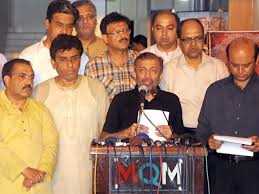
(Credit: tribune.com.pk)
After the election commission turned down the MQM’s request to hold re-polling in the entire NA-250 constituency, the Karachi-based party announced the boycott of re-election on May 19. The party’s decision to stay away from polling at 43 polling stations has left the field open for Imran Khan-led Pakistan Tehreek-e-Insaf. The Jamaat-e-Islami Karachi chief, Muhammad Hussain Mehanti, has already congratulated Dr Arif Alvi for winning the hotly contested seat.
Senior journalist Zahid Hussain said that for the first time, the MQM had faced public pressure on city streets and the party realised the situation and boycotted the re-election.
“It was the public challenge to the MQM that forced it to retreat from its position,” he said. “This is a major political change and can impact Karachi politics.”
The MQM won the seat in 2008 which was won by the JI in 2002. The rightwing party had also won this seat in 1993 while the Pakistan Muslim League-Nawaz emerged victorious in 1997.
This time, Imran Khan, the cricketer-cum-politician, has glamorised politics and attracted the upper- and upper-middle class to support the slogan of change.
On 11 May, after widespread complaints of rigging in all constituencies of Karachi, the JI had announced the boycotted of all elections in Karachi. So Naimatullah Khan will not participate in the re-polling. Under an electoral alliance, the PML-N withdrew its national assembly candidate against the JI in return of support for its two provincial assembly seats on PS-112 and PS-113.
The situation might change further, however, as Saleem Zia, the PML-N candidate on provincial seat, told The News that he was also an independent candidate on NA-250. But he added that he could withdraw if the PTI’s Dr Arif Alvi agreed to support him on the provincial seat.
The Pakistan People’s Party candidate Rashid Rabbani is also in the run for the national assembly seat. The PPP’s Waqar Mehdi announced the party would fully participate in the re-polling process both on national and provincial assembly seats.
Another senior journalist Babar Ayaz said the election commission must reconsider the MQM’s plea to hold re-polling in the entire NA-250 constituency. “The boycott of the MQM is not in the interest of democracy,” he claimed.
“The vote bank of the MQM has reduced indeed but the party still enjoys 18 national assembly seats in Karachi,” Ayaz said. “There will be no big political changes if the MQM loses out on one seat. I cannot see any major political changes in the near future despite the people being fed up with the law and order situation.”
The MQM had changed the political demographics in the 1980s when the party emerged as a strong political group after local body elections. Since then the party has won almost all the elections. While the people’s mindset had changed after the ethnic divide and then sectarian polarisation and the people supported the MQM, the call to change the political players attracted the people and they joined the struggle for a change.
But whatever the result of this re-polling will be, the political intensity will grow in city.
Independent observers believe that the threat for the MQM will grow in the coming days. The former coalition partners of the MQM, the Awami National Party and PPP, have also lost their popularity and support in Karachi and the re-polls will provide space for new players – a major setback for the old guards.
